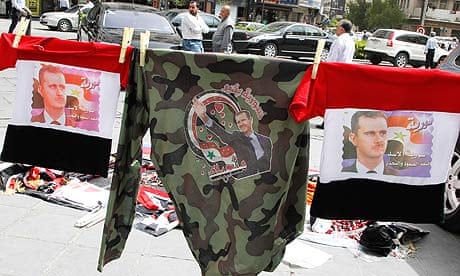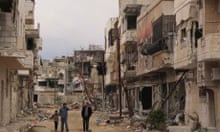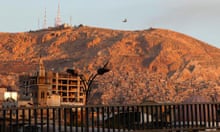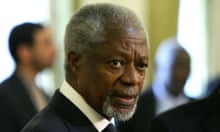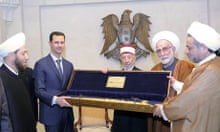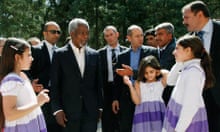UN-backed plans for a ceasefire and negotiations in Syria have been thrown into doubt by a new demand from President Bashar al-Assad that armed groups guarantee to halt all violence before regime forces are withdrawn from flashpoints across the country.
Kofi Annan, the former UN secretary-general, had called for a pullout to be completed on Tuesday with a full ceasefire 48 hours later.
But after days of intense violence, Damascus insisted on Sunday that it would first need written guarantees from the opposition. Continuing bloodshed, deep mistrust after more than a year of the uprising and the fragmented nature of the anti-Assad forces means such guarantees are unlikely to be forthcoming.
Saturday saw more deadly attacks, with between 74 and 160 people reported killed under bombardment in the provinces of Idlib and Aleppo, and in Hama. The figures could not be confirmed independently because of severe restrictions on the media.
Jihad Makdissi, a spokesman for the Syrian foreign ministry, said on Sunday that earlier statements that Damascus would withdraw troops from cities and their suburbs by Tuesday amounted to "a wrong explanation".
Scepticism about Assad's readiness to implement Annan's six-point plan was rife from the start, but the western governments who dominate the Friends of Syria group argue that it is the "only game in town", given Russian support for Assad and the lack of appetite for outside intervention.
"This is a totally predictable move," said Emile Hokayem, of the International Institute for Strategic Studies. "By accepting Annan's plan, Assad wanted to demand – and get – reciprocity to put pressure on a fragmented opposition. Russia will support this demand and the Friends of Syria have painted themselves into a corner. Can they really say no at this point?
"And Assad thinks that the moment a senior diplomat or official knocks at his door, that he's back in the game."
The latest Syrian government offensive has sent thousands of refugees surging into Turkey, which is now braced for a further influx.
"We are taking measures for this, though we will not close the gates," said Recep Tayip Erdogan, the Turkish prime minister. "The UN, however, has to toughen its stance."
On Saturday, the Syrian military shelled the Deir Baalba district in Homs, killing four people, Reuters reported the grassroots Local Co-ordination Committees opposition as saying. Amateur video showed scenes of carnage said to be the aftermath of the shelling.
Mangled limbs and body parts in blankets were being loaded on a pickup truck. A second video showed 13 men who appeared to have been tied up and executed.
